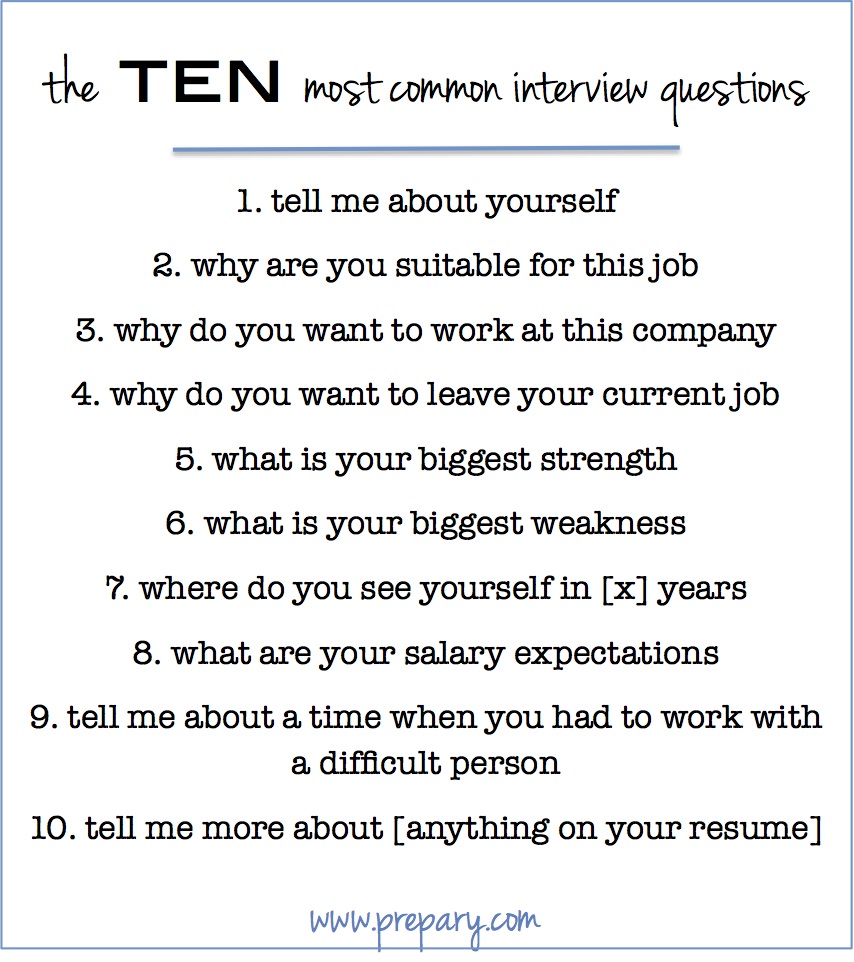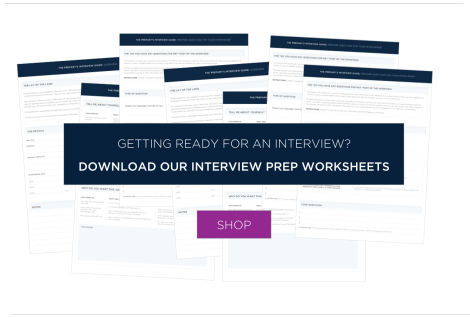This post is going to cover how to answer the 10 most common interview questions. As a former recruiter, I’ve asked these thousands of times because they do give a lot of insight to who a candidate is and if they might be a good fit for an open role.
For each of the 10 most common interview questions below, I’ll give a few quick tips as well as links to other posts with more detailed information on how to answer them:

Common interview question 1: Tell me about yourself / walk me through your resume
How to answer: Tell a short (under 1-3 minutes) but interesting story that highlights the most relevant parts of your work experience, education, and other skills/hobbies.
The best answers are chronological and each part of the story builds on the part before. An example from my own career path would be:
“I’ve always been interested in the way people work and therefore decided to study Psychology at NYU. Upon graduation I started my first job and JPMorgan where I [key responsibilities]. From there, I [explain reason for transition] and landed at Tory Burch where I spent the next 4 years in a number of roles. I was responsible for [key responsibilities/results]. [continue on]”
I recommend ending this answer in the present moment by explaining how you came across the job you’re interviewing for and why it’s the right move for you at this stage in your career.
Additional resources: more on how to answer this question here
Common Interview Question #2: Why are you suitable for this job?
How to answer: This is the interviewer asking you how what you’ve done in the past will enable you to do the tasks of the job you are interviewing for.
Study the job description and for each responsibility listed, think of an example from your past when you have done a similar task. You can also speak to what skills you’ve developed that would help you do a great job. You can frame the answer like this:
“I noticed on the job description that X is one of the main responsibilities in this job. In my last role as a Y, Z was one of my main responsibilities and definitely have prepared me to do X.”
If there’s anything you haven’t done, don’t worry. Most interviewers don’t expect you to make a career move to do that exact same thing you were doing. Finding relevant and transferable experience is key.
Additional resources: More on how to answer this question here.
Common interview question #3: Why do you want to work at this company? / What do you know about this company?
How to answer: You are being asked this because employees who are passionate about a company are more likely to be more passionate about their work.
Additionally if your interviewer really loves the company they work for, that’s something they’ll want to connect with you on.
There are many good reasons why you may want to work at a certain company like the leadership, the mission, the business, the culture, the product, etc.
Do your research beforehand, pick the reasons that are genuinely most important to you, and be ready to speak to them.
Additional resources: More on how to answer this question here.
Common interview question #4: Why are you looking to leave your current job? / Why did you leave your last job?
How to answer: You probably have totally legitimate reasons for leaving your last job or wanting to leave your current one. As long as you’re diplomatic, feel free to give a truthful answer. Here your interview wants to make sure that the themes behind leaving won’t reoccur in the current role. For example, if you are leaving because there are no growth opportunities but the interviewer knows this company also won’t have growth opportunities, it may be something they think about before offering you the job.
Additional resources: More on how to answer this question here.
Common interview questions #5 & #6: What are your biggest strengths and weaknesses?
How to answer: These questions are sometimes asked together and other times separately.
When you talk about your strength, list one that is relevant to the job (you’ll learn what they’re looking for in the job description). Also, always be able to back up your claim with multiple examples of times when you used that strength.
For your weakness, give a true, honest weakness (not a bs one) but make sure your weakness isn’t a skill that is critical to the job.
Additional resources: Read more on how to answer “what is your biggest strength” and “what is your biggest weakness”
Common interview question #7: Where do you see yourself in X years?
How to answer: This question is being asked because the company wants to see if your own career goals align with those of the company. In other words, can you achieve your goals there, or will you have to leave in the near future?
You want to come across as ambitious and make it clear that you’ve thought about your longer term career goals without making the company feel that you’re going to leave quickly to other opportunities.
For example, going to grad school or starting your own company are great professional goals, but not a great answer to this question.
Additional resources: More on how to answer this question here.
Common interview question #8: What are your salary expectations?
How to answer: This may not always be asked in the first interview but it will likely be asked at some point in the process. It’s a tricky one and many people will tell you to lie.
I personally do NOT believe in lying (it can come back to haunt you and lose you the job) but I do suggest you do your research and have a firm and educated expectation.
Additional resources: More on how to answer this question here.
Common interview question #9: Tell me about a time when you’ve worked with a difficult person or manager
How to answer: This question may not always be asked in this exact form but you will be asked about what you’ve done when you’ve encountered difficult situations.
You’ll want to make sure you stay diplomatic whenever you answer a question like this and also show that you acknowledge your responsibility in the situation and resist the temptation to blame others.
You also want to show that you handled it in a way that was unemotional and professional.
Additional resources: More on how to answer this question here.
Common interview question #10: Tell me more about…
How to answer: When you submit a resume, you basically give the interviewer the right to ask you to elaborate on any part of it. That’s why you should never lie about something you’ve done and why you should be prepared to speak to all the different aspects of your resume.
Careers can be long, so before going into an interview, definitely make sure you refresh yourself on your own resume and think of big wins and accomplishments from each role.
I hope this post has given you a somewhat quick overview of how to answer the most common interview questions out there.
There’s a lot of detail behind each one, so before you go in for that interview, take a look at the more detailed posts to get more in depth information on how to answer these questions.
Good luck – you’re going to be great!






